
The captain of the Pakistan women’s team is challenging preconceptions in her homeland and beyond as she leads a fight for equality and recognition
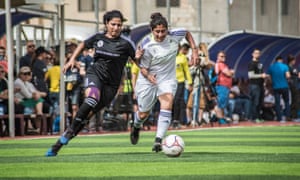
Karachi is the capital of the province of Sindh, the most populous city in Pakistan and among the biggest in the world. Bordering the Arabian Sea, it is home to more than 21 million people.
Here football is the opiate of the people. It comes as no surprise that Hajra Khan first played outside her home with other children, keeping goal in a net chalked out against a neighbouring wall. However, it was not until she was 14, preoccupied with basketball and track and field, that her mother came across football tryouts in the local Sunday paper and told her to give it a shot.
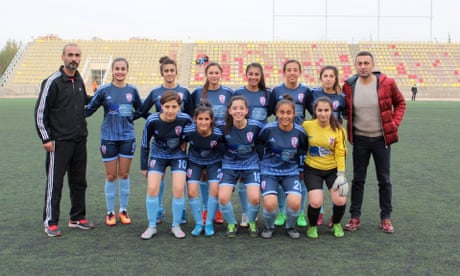
How football is saving the lives of Turkish girls in Malatya
Read more
Ten years on, Khan’s talent has forced football to transcend the country’s historically rigid gender norms and has proved to be a vehicle for change. Khan was made captain of the Pakistan women’s team at the age of 20. She is the country’s highest-scoring female footballer, a Unicef ambassador and the first Pakistani player, male or female, to be signed by a foreign club.
As a child Khan was quiet but she has been anything but when it comes to her national team’s struggle for equality. At the most recent training camp the women were paid $3 a day to the men’s $10. “Dentists, economists, engineers and school girls quit their livelihoods just to be at that camp, a camp that pays a quarter of what they were earning,” Khan says.
Demands from the women’s team for more appear to have had an impact. It was announced in April that the wage would be increased to $10 a day – although the men’s pay was doubled to $20. Khan’s fight is part of a global picture, with female footballers across the US, Norway, Brazil, Ireland and most recently New Zealand demanding gender parity.
We realised everyone was paid unfairly, treated poorly, and figured the only way to make this work was to work together
Though there is no ignoring the signs of progress in Pakistan, with a historic transgender rights bill passed this month, sexism is pervasive in the Islamic country – which gained notoriety for arguably being one of the most oppressive countries for women, ranking second-worst on the Global Gender Gap index. Men’s teams are not only paid more but granted priority in pitch bookings over women’s teams, who then have to train on cricket pitches or any surface that suffices. And the problems run deeper.
“Say if there’s a photo with the national team on Facebook, there’s going to be 100 negative comments about how she’s not Muslim, how she’s a disgrace to the country,” Khan says. “They don’t care of the skill that the girl has, or the credibility that she holds, or that she’s representing the national team.”
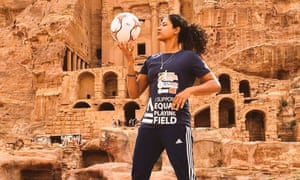
In an attempt to improve football in Pakistan, Khan has spent the past few months organising international friendlies and local matches to keep the team active, despite the absence of structural support and a lack of Fifa affiliation, which means they cannot be officially labelled a national side. It is uncertain whether they will be able to participate in the Asian Games, which begin in Indonesia in August.Advertisement
Khan has travelled for trials in Germany with the Bundesliga clubs SGS Essen, FSV Guterslohand and VFL Sindelfingen, appeared in Coca‑Cola advertisements and played in the Maldives National Women’s League but is still assailed with remarks about female fragility and doubts about how a woman could pursue a “man’s game”. Her reply? “If your son can play it, I sure as hell can play better than he can.”
Shattering this stereotypical mindset is not straightforward but Khan did recently break a world record: she played the world’s lowest-altitude football match on the shores of Jordan’s Dead Sea, 420m below sea level. The event, organised by Equal Playing Field, a non-profit organisation pushing to end gender inequality in sport, brought together women of 29 nationalities. They hiked through the desert mountains, organised football clinics in local towns and played the record‑breaking match – in which Khan scored the winning goal despite having a broken toe from parading around the Seven Pillars of Wisdom hours earlier.
“We spoke about how things work in our country and how each of us has struggled to make a mark whether in our sport or in the work that we’re doing,” Khan says. “And we realised that everyone was paid unfairly, treated poorly, and we kind of figured the only way to make this work was to work together for our cause and raise awareness.”
While Khan finishes her degree in international relations from the London School of Economics, she is dreaming of creating an NGO to combat the stigma of mental illness among professional athletes and starting an academy to provide girls with direction from a younger age.
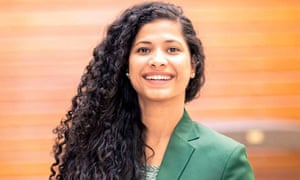
We speak just after she has returned homefrom giving her first TED talk in Pakistan’s capital, Islamabad, focused on athletes and mental health. She opened up about her clinical depression in an attempt to destigmatise mental illness among professional athletes.
“When an athlete gets physically injured, there’s doctors, physiotherapists, everyone’s trying to work on their recovery so the player can get back on the field as fit as possible, but when it comes to their health issues, the treatment is not the same,” Khan says pointedly. “If you have some sort of illness, you’re portrayed as weak and as athletes we’re not supposed to be weak; it’s a complete antithesis of what athletes are supposed to be.”
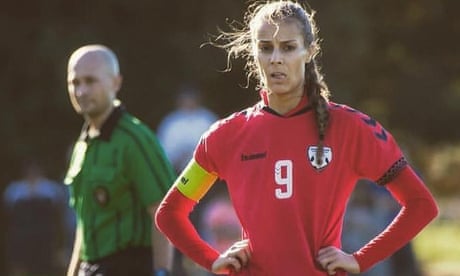
Afghanistan captain Shabnam Mobarez on a footballing mission in Denmark
Read more
Khan feels there is a lack of female role models and managers. To encourage more girls to play, and in the hope of serving as a mentor Khan has visited players’ houses to convince parents of their daughters’ talents and offer support. “I feel like it’s changing,” she says. “Slowly, but it’s definitely changing.”
Change came most recently in Peshawar, in northern Pakistan, with announcements of a first transgender sports league. When she heard the news, Khan beamed with happiness. She plans to contact the league and expand it to other cities.
“I have great friends in the transgender community who are fighting the cause day and night. I think football can make a big difference if we work together.”
